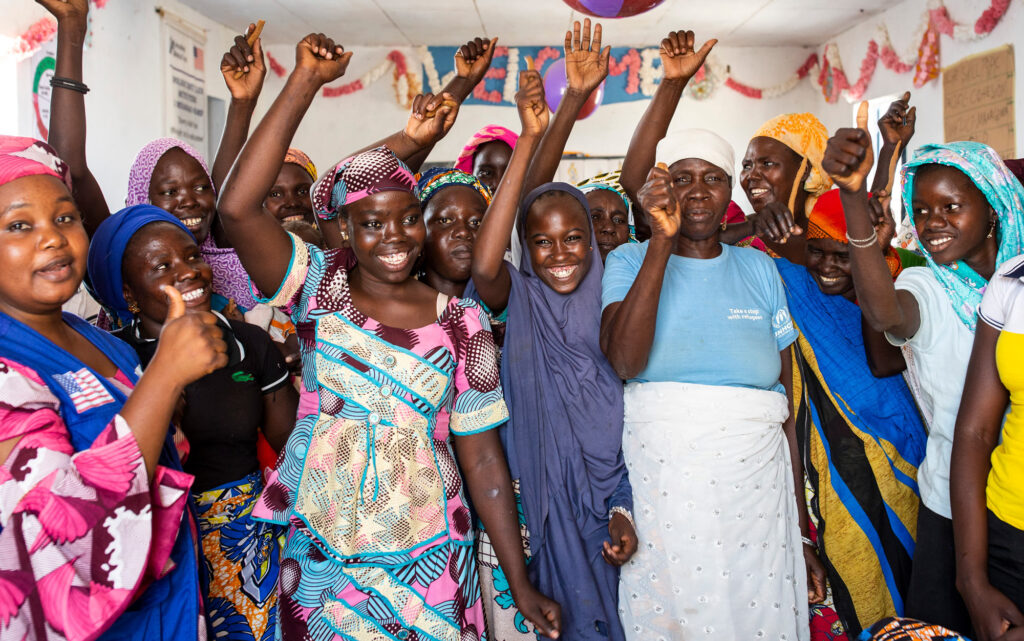
Cameroon
International Medical Corps began working in Cameroon in 2008 in response to an influx of refugees from the Central African Republic (CAR) along Cameroon’s eastern border. Today, Cameroon hosts more than 579,000 internally displaced persons (IDPs) and refugees. The Northwest and Southwest regions together host nearly 650,000 IDPs.
International Medical Corps is working in refugee camps—in Adamawa, East, Far North, North and Northwest—and with some of the most vulnerable populations in Cameroon to implement health programs that include disease surveillance, nutrition activities, gender-based violence (GBV) prevention and response, mental health and psychosocial support (MHPSS) and child protection.

27.9 million
60 years
588,000
The Challenges
Our Response

Primary and Secondary Healthcare
International Medical Corps in Cameroon supports healthcare facilities across five regions, and provides medical care directly through static health facilities, community health services and mobile outreach. Our services include preventive and curative medical consultations, reproductive health services, including ante- and post-natal care; provision of essential drugs, medical supplies and equipment; and construction and rehabilitation of health facilities.
We also provide training for healthcare professionals and for community health workers, who educate local residents on public health issues, engage in disease surveillance and follow-up on vaccine-preventable illnesses such as polio, neonatal tetanus, yellow fever and measles. International Medical Corps supports community-based surveillance of diseases of epidemic potential, including polio, cholera and malaria, helping to facilitate early detection, prevention and response. Over the last five years, these efforts have led to a significant reduction in cholera cases in several health districts in the Far North and Littoral regions of Cameroon.

Food Security and Livelihoods
Climate change has led to drought, floods and landslides throughout the country. In August 2022, floods in the Far North region led to the displacement of more than 70,000 and affected more than 258,000 people. Since then, heavy rains have submerged more than 35,000 hectares of fields and killed thousands of livestock.
In response, International Medical Corps supports small-scale agriculture and livestock assistance, kitchen gardening, food distribution, income-generating activities and women’s economic empowerment programs that complement our nutrition and GBV programs. We also provide livelihood support—operating community cooperatives, implementing community health monitoring and surveillance, developing community groups to support change in climate-resistant food production and nutrition practices, and providing agricultural assistance and training on fishery and animal husbandry, to help people diversify and decrease climate change-related risks to their sources of income.

Nutrition
Malnutrition rates remain high in Cameroon. As a combined consequence of regional and intercommunal conflicts, the impacts of climate change—especially floods and droughts—and the Russian invasion of Ukraine, more than 3 million people in Cameroon are acutely food insecure. As a result, many children do not have the nutrients required for healthy development, leading to irreversible cognitive and physical stunting.
International Medical Corps provides nutrition interventions that include screening and treatment for acute malnutrition, cooking demonstrations and nutrition education in our infant and young-child feeding (IYCF) spaces, vitamin A supplementation, deworming, social and behavior change communication, and training for Ministry of Health (MoH) staff and community health workers (CHWs).

Gender-Based Violence
International Medical Corps has been implementing GBV prevention, response and protection programming in Cameroon since 2009. Our staff trains community-based organizations, local administrative staff and healthcare professionals on GBV core concepts; refers survivors to local healthcare providers; and trains local health staff on clinical management of rape cases. We also provide MHPSS services to survivors and other women and girls, while educating community members on the risks and consequences of GBV.

Child Protection
Forced child marriage, child labor and lack of educational opportunities for girls continue to impede children’s rights in Cameroon. International Medical Corps works in refugee camps and host communities to prevent child abuse and promote the rights of internally displaced children, as well as refugee children from the Central African Republic and Nigeria.
Our staff trains community-based organizations, government personnel and local NGO staff to promote children’s rights and to prevent and respond to abuse, violence, exploitation and neglect. We provide recreational education, socio-emotional learning and basic education in safe healing and learning spaces. Our case management teams provide material support to unaccompanied and separated children, children associated with armed forces and armed groups, and children with disabilities.


